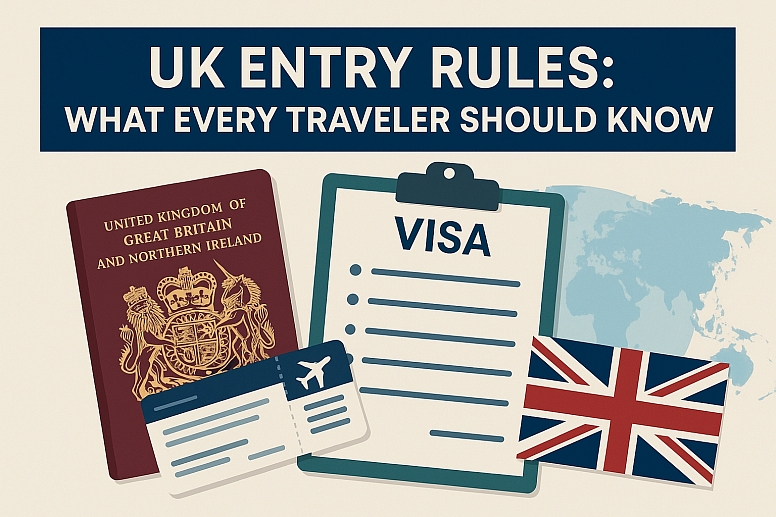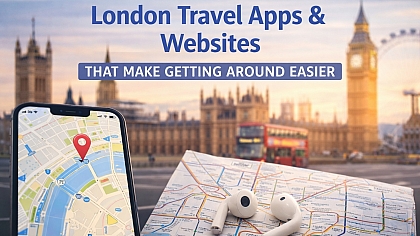
Moving to the UK? What a First-Time Visitor Should Know
The United Kingdom continues to be one of the most popular destinations for tourists, students, and immigrants from all over the world. Whether you're planning a short trip to explore the beauty of the UK or considering a long-term stay, there are a few essential things every newcomer should be aware of. From entry requirements to understanding your visa options, being well-prepared can help you avoid last-minute hurdles and ensure a smooth journey.
Understand UK Entry Rules Before You Fly
Travelers often assume that entering the UK is as simple as booking a flight and showing up with a passport. However, the UK has specific entry rules depending on your nationality, purpose of visit, and length of stay. Whether you're visiting for tourism, study, or work, it’s vital to check the latest UK entry rules to avoid issues at the border.
For a clear and updated guide, you can refer to this helpful resource:
UK Entry Rules: What Every Traveler Should Know
Visa Types and Their Purpose
If you’re planning to stay in the UK longer than a few weeks, you'll likely need a visa. The UK offers different visa types depending on the purpose of your visit:
- Tourist Visa (Standard Visitor Visa): For sightseeing, short business trips, or meeting family/friends.
- Student Visa (Tier 4): For academic courses, language schools, or university programs.
- Work Visa (Skilled Worker Visa): For those with job offers from UK employers.
- Family Visa: For spouses, children, or relatives of UK residents or citizens.
- Transit Visa: For those changing flights in the UK.
Each visa type has its own eligibility requirements, fees, and documentation checklist. Make sure you apply through the official UK Visas and Immigration (UKVI) portal and double-check your application.
How Long Can You Stay in the UK Without a Visa?
This depends entirely on your country of citizenship. Most visitors from visa-exempt countries can stay for up to six months as tourists without needing a visa. However, you can’t work or study during this time.
Some travelers mistakenly think that they can extend their stay or switch visas after entering the UK, but that’s rarely the case. If you’re unsure about your status, it’s best to apply for the correct visa before entering.
Documents You Should Carry While Traveling
Even if you don’t need a visa, immigration officers at the airport can still question your intentions. It’s always good to carry the following:
- A valid passport (with at least 6 months before expiration)
- Return or onward ticket
- Proof of accommodation (hotel booking or host’s address)
- Travel insurance
- Bank statements or proof of funds to show you can support yourself
Also, make sure your passport matches any online visa applications. Minor mismatches in name or date of birth can cause delays.
Want to check if your passport is valid for UK travel? This guide can help:
Passport Requirements for the UK
Planning to Visit the US from the UK? Here is How
It’s common for travelers in the UK to also plan short trips to the US. However, getting a US tourist visa while you’re in the UK isn’t as simple as walking into an embassy. You need to:
- Complete the DS-160 application online
- Pay the visa fee
- Schedule an interview at the US Embassy in London or Belfast
- Carry your UK visa and proof of stay to the interview
The waiting times can vary, so plan well in advance if you’re thinking of traveling from the UK to the US.
PR (Permanent Residency) in the UK: Can You Stay Long-Term?
If you’ve been living in the UK for several years and want to make it permanent, you’ll need to go through the UK PR process, which includes:
- Living legally in the UK for a certain number of years
- Meeting income, language, and residency requirements
Applying for Indefinite Leave to Remain (ILR)
After ILR, you can eventually apply for British Citizenship, which allows you to get a UK passport.
While this isn’t something first-time visitors need immediately, it’s useful to understand the long-term options in case you plan to study or work in the UK and eventually settle.
Health Insurance and the NHS
If you’re staying in the UK for more than 6 months, you’re likely required to pay the Immigration Health Surcharge (IHS) as part of your visa application. This gives you access to the National Health Service (NHS) during your stay.
Short-term visitors should consider getting international travel insurance to cover emergencies, hospital visits, and other unexpected situations.
Currency, Transport, and Local Customs
Understanding the everyday norms—how people get around, pay for things, and interact—is essential for a stress-free visit. Here’s a deeper dive into the most practical areas to help you navigate the UK with ease.
Currency in the UK: Pounds, Not Euros
One common mistake travelers make is assuming the UK uses the Euro. The UK’s official currency is the British Pound Sterling (£), often abbreviated as GBP.
Currency Denominations: Banknotes come in £5, £10, £20, and £50. Coins include
£1, £2, 50p, 20p, 10p, 5p, 2p, and 1p.
Exchange Rates: Exchange rates fluctuate daily, but you can convert major currencies at banks, post offices, or currency exchange counters at airports. However, airport rates are often less favorable.
ATMs: Widely available and support most international debit/credit cards. Many ATMs don’t charge withdrawal fees, but check with your home bank.
Card Payments: The UK is largely cashless. Visa, Mastercard, and contactless payments are accepted almost everywhere, including small shops and buses.
Tip: If you’re offered the option to pay in your home currency or GBP during card transactions, always choose GBP to avoid poor conversion rates and extra fees.
Public Transport: Efficient, But Learn the System
Public transport in the UK is excellent, especially in urban areas. Still, the systems can feel confusing if you’re not familiar with them.

London:
Use an Oyster Card, contactless debit/credit card, or smartphone (Apple Pay/Google Pay) to pay for the Tube (underground subway), buses, trams, and trains.
Daily caps help save money—no need to buy day passes.
Avoid traveling during peak hours (7:30–9:30 AM and 5:00–7:00 PM) if possible, to skip crowds and higher fares.
Other Cities:
Cities like Manchester, Birmingham, and Edinburgh have extensive bus, tram, and local train networks.
Buy tickets at stations or use mobile apps like Trainline, Stagecoach, or National Rail for bookings and schedules.
Intercity Travel:
National Rail operates most trains between cities. Booking early online can save up to 50–70%.
Coaches (long-distance buses) like National Express and Megabus are budget-friendly options.
Local Laws and Behaviour Tips
Understanding a country’s laws and cultural behaviours is just as important as knowing how to get around or where to stay. The UK is known for its order, politeness, and structured way of life, and being aware of what’s acceptable—and what’s not—can help you avoid misunderstandings or legal trouble.
While the laws may seem familiar if you’re coming from another Western country, there are some uniquely British expectations around public behaviour, social interaction, and respect for rules that every visitor should know.
When in the UK, remember:
- Smoking in enclosed public spaces is prohibited.
- Drinking alcohol in public places is banned in some cities.
- Always stand on the right side of escalators in the Tube stations!
- Being respectful, saying “please” and “thank you,” and forming queues (lines) are cultural basics.
Note: Be Prepared, Not Panicked
Whether you're visiting the UK for the first time or preparing to settle in, understanding the basics can go a long way. From knowing your entry rules and visa types to being ready for day-to-day challenges, a little preparation makes your experience smoother.
If you’re looking for updated, reliable, and practical information on travel and immigration topics, CityBit.in is a great place to start. Their guides are written for real users, explaining not just the rules, but also the “how” behind them.











